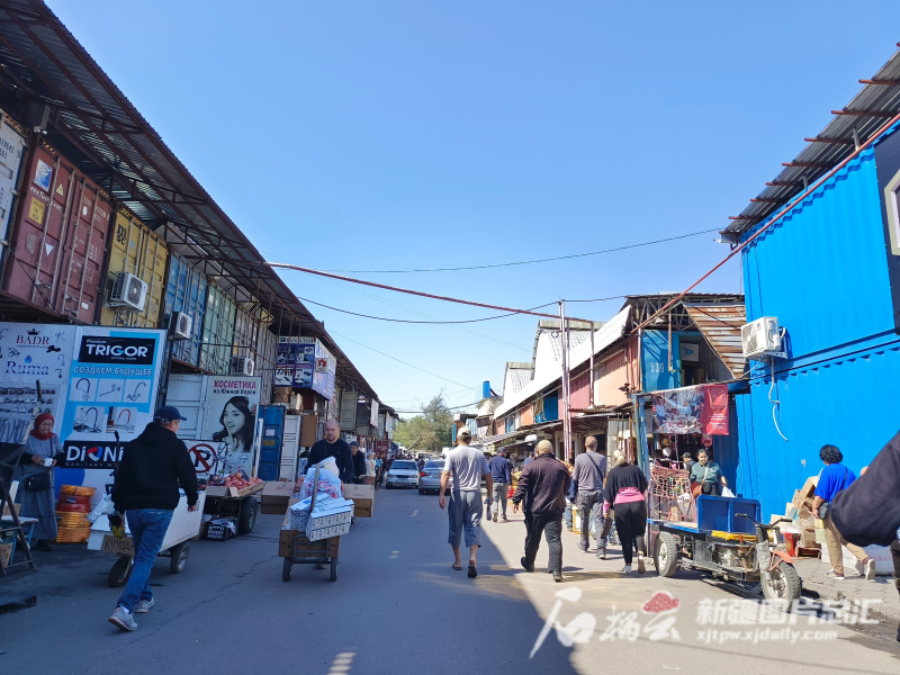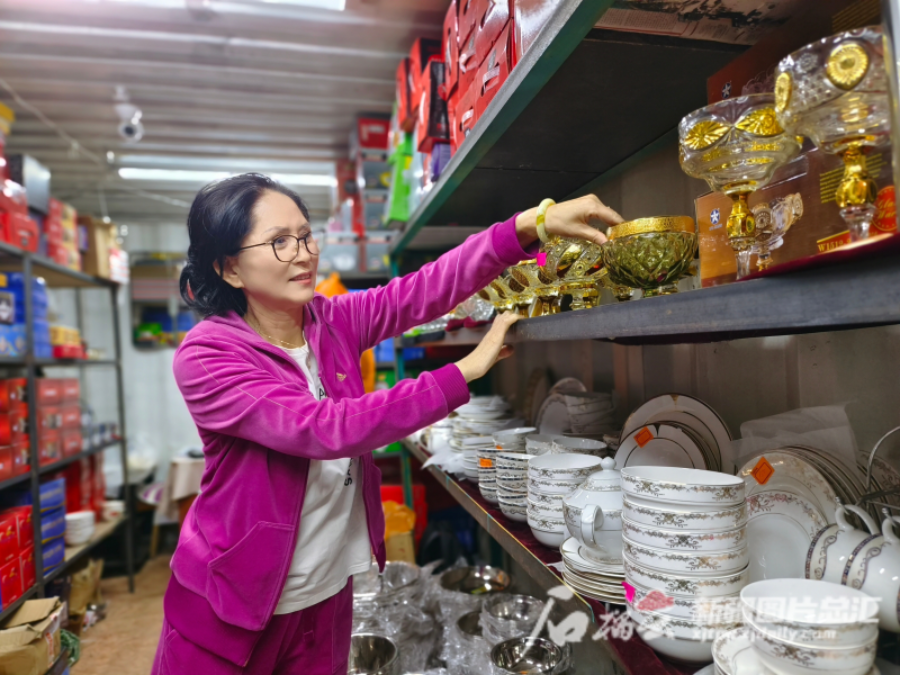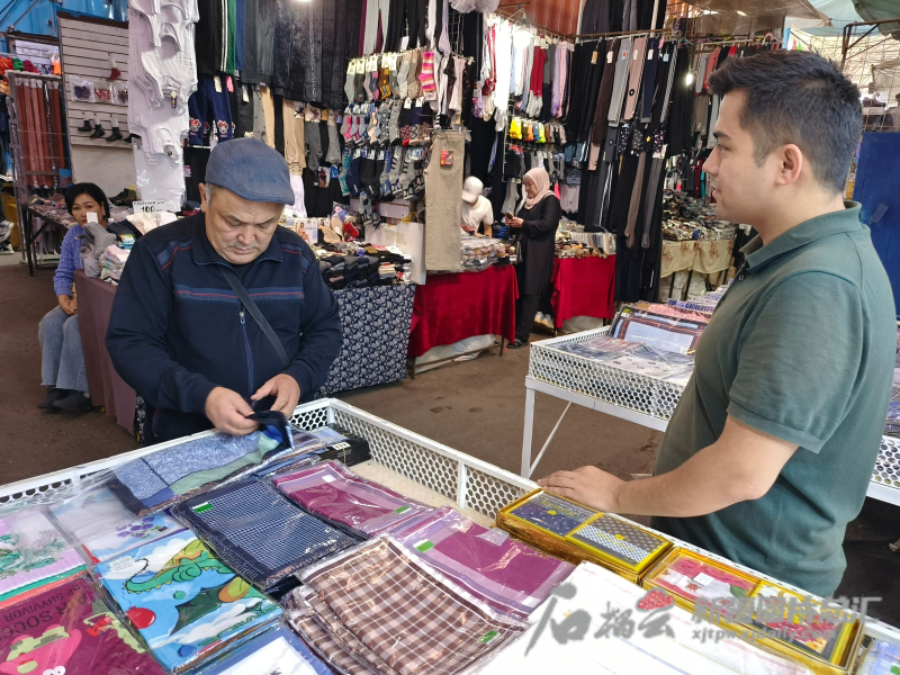Shiliuyun-Xinjiang Daily (Reporters Li Hua, Hei Hongwei, Liu Xiang) news: On September 21, 2023, the reporting team of "Road of Prosperity—Belt and Road Reporting Project" organized by the Propaganda Department of the Party Committee of Xinjiang Uygur Autonomous Region, visited the largest Chinese goods market—“Sino Ocean” market in Bishkek, the capital of Kyrgyzstan, to experience the trade prosperity brought by Belt and Road Initiative.

Photo shows a corner of “Sino Ocean” market in Bishkek, Kyrgyzstan. (Photo by Shiliuyun-Xinjiang Daily/Hei Hongwei)
"I want this set of porcelain, is there any other pattern?" "We have these patterns, and you can also customize the pattern you want." Stepping into a stall in the market, Su Fengying, a 56-year-old Xinjiang businesswoman, was communicating with Kyrgyz customers.

Photo shows Su Fengying introduces porcelain bowls to the reporters in Bishkek, Kyrgyzstan. (Photo by Shiliuyun-Xinjiang Daily/Hei Hongwei)
The reporter was amazed at Su Fengying's fluent local language. "Basic communication in the local language is not a problem," said Su Fengying. "When you venture out to do business, the first thing you need to overcome is the language barrier."
Having been in the “Sino Ocean” market for over 20 years, Su Fengying has a good understanding of the local culture and market demand. "Nowadays, people are no longer just looking for cheap goods," she said while showing a set of tableware processed by a company in Urumqi with ethnic designs, which were of good quality. "Many consumers will choose this as a gift for their friends and families."
As market demand increases, Su Fengying has not only improved the quality of her products but also expanded the variety of goods. Besides porcelain, she has added many stainless steel products to her store, hoping to bring more high-quality Chinese goods to the local market.
In the “Sino Ocean” market, each shop is composed of two stacked containers, with the lower layer serving as the sales floor and the upper layer as a temporary warehouse. The shop of Xinjiang businessman, Kui Guoxing, has connected the two containers, making the store look much brighter. Packaging bags, tapes, and other daily necessities are neatly arranged in the shop.
"I'll take two packets of each kind." On September 21, 2023, a businessman from Kant in Kyrgyzstan, Yasinlidevanov Janbulatovich, came to Kui Guoxing's shop to buy packaging bags. Since he was an old customer, the transaction was completed quickly.
Yasinlidevanov introduced that he usually comes to the “Sino Ocean” market to buy goods once a week. The products here have a high cost performance and are of complete range, and are popular among people.
Kui Guoxing said that with the advancement of the Belt and Road Initiative, trade between Kyrgyzstan and China’s Xinjiang has been increasing. In order to adapt to economic development and meet the needs of local consumers, he is also thinking about how to transform.
Kyrgyzstan was once an important commercial and trade transportation passageway on the ancient Silk Road. After years of development, it has become a trading hub for Chinese goods in Central Asia.
Wandering through the numerous shops in the market, businessmen of different skin colors and nationalities are negotiating business deals. The bustling scene is full of lively sounds, showing prosperity.
Zhao Jiangong, president of the Kyrgyzstan Chamber of Chinese Commerce, said that one should not underestimate this market. Chinese goods are distributed from here to various regions in Kyrgyzstan, Central Asia, and even other countries in Europe and Asia.
The “Sino Ocean” market houses thousands of kinds of small commodities, with light industrial products accounting for the vast majority of the market share. From small items like a safety pin or a bar of soap, to larger items like small household appliances or electric tools, most of which are made in China, they continuously enter ordinary households through the distribution center — “Sino Ocean” market.
"Chinese products account for about 85 percent of the products in the ‘Sino Ocean’ market, and Chinese goods are cheap and of great variety, and are very popular in Kyrgyzstan and neighboring countries. " Zhao Jiangong said.
How to stand out among so many Chinese products? Kui Guoxing, a businessman from Xinjiang, has the answer. "Sell what sells well." He said that he adjusted his product categories twice and finally chose to sell products such as tapes and plastic bags.
It is evident that, in addition to allowing Kyrgyz people to buy high-quality and affordable goods, almost every shop in the market employs several local sales assistants. Chinese merchants in the “Sino Ocean” market provide a large number of employment opportunities for the local community, contributing to their income increase.
37-year-old Aysen Dulubayev, a citizen of Bishkek, has been working in Su Fengying's shop for eight years.
"The wages here are far higher than the average wage in Bishkek," said Aysen Dulubayev. More importantly, he can learn about how to do business from Chinese.
Hazirtiali Umar, born in 1996, is a young generation of ethnic Chinese in the “Sino Ocean” market. In 2013, he followed his cousin Ablajan Kurban to come to the market to do business.

Photo shows Hazirtiali Umar introduces products to customers in Bishkek, Kyrgyzstan. (Photo by Shiliuyun-Xinjiang Daily/Hei Hongwei)
Unlike his previous generation who learned language through doing business, Hazirtiali started learning the language when he first came to Kyrgyzstan. Two years of language classes have enabled him to communicate with locals without any barriers.
Being resourceful, Hazirtiali noticed that the sales of his handkerchiefs had been declining over the past two years. With the continuous development of the internet, online shopping is becoming prevalent in the region, and more people are choosing to stay at home and shop on mobile apps like AliExpress and Alibaba, enjoying the convenience brought by online shopping.
Hazirtiali said that e-commerce services in Kyrgyzstan are still in their early stages of development, and it is not easy to develop local e-commerce platforms. It requires constant market research to understand consumer needs. He also wants to learn about live-streaming e-commerce, using this method to expand sales channels. He plans to continue his studies and pursue a university degree in management and e-commerce.
Zhao Jiangong said that with the impact of e-commerce, business people in the “Sino Ocean” market are actively changing their ideas, and enterprises are transforming by setting up showrooms, customizing products, developing cross-border e-commerce, and establishing overseas warehouses.
(A written permission shall be obtained for reprinting, excerpting, copying and mirroring of the contents published on this website. Unauthorized aforementioned act shall be deemed an infringement, of which the actor shall be held accountable under the law.)









